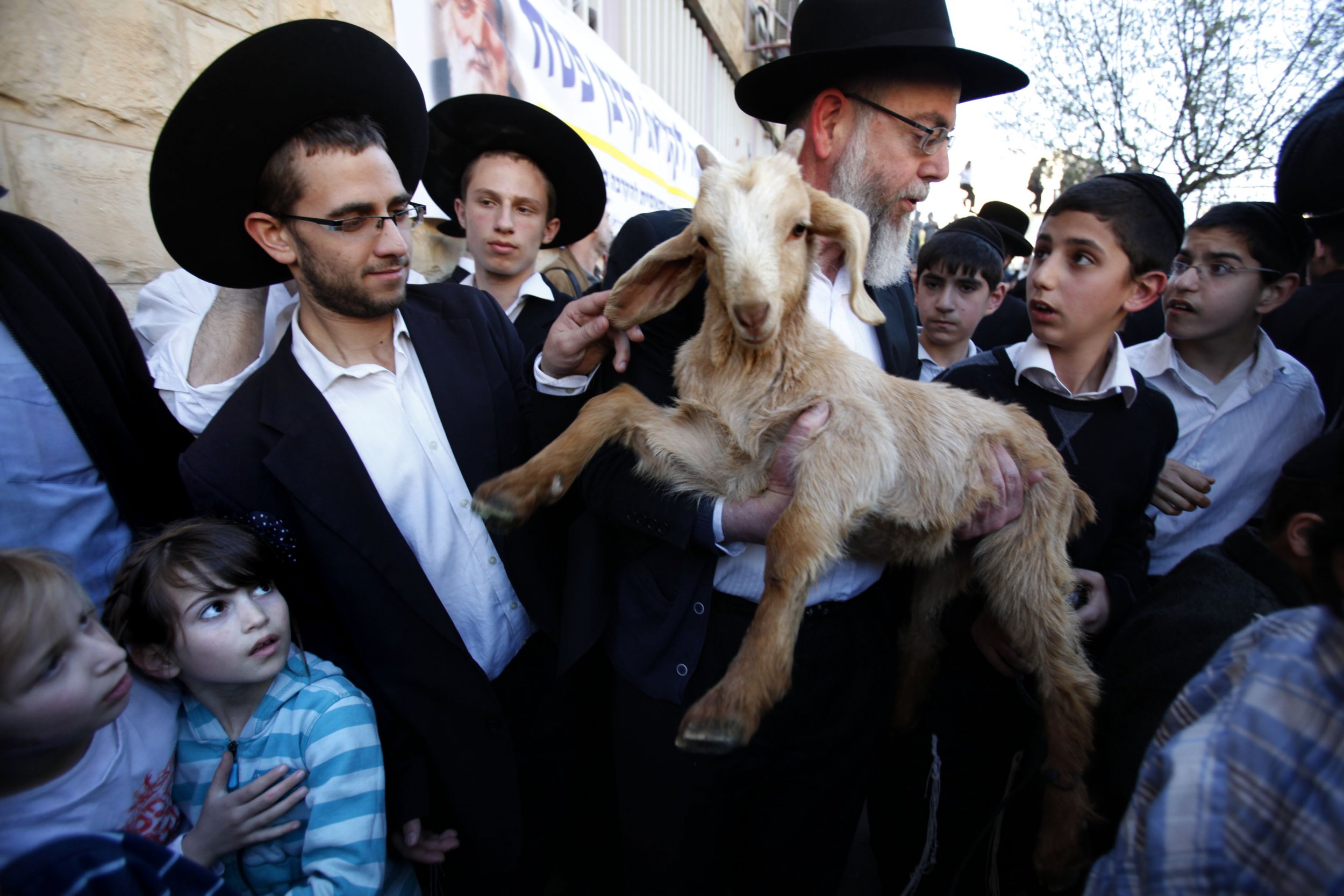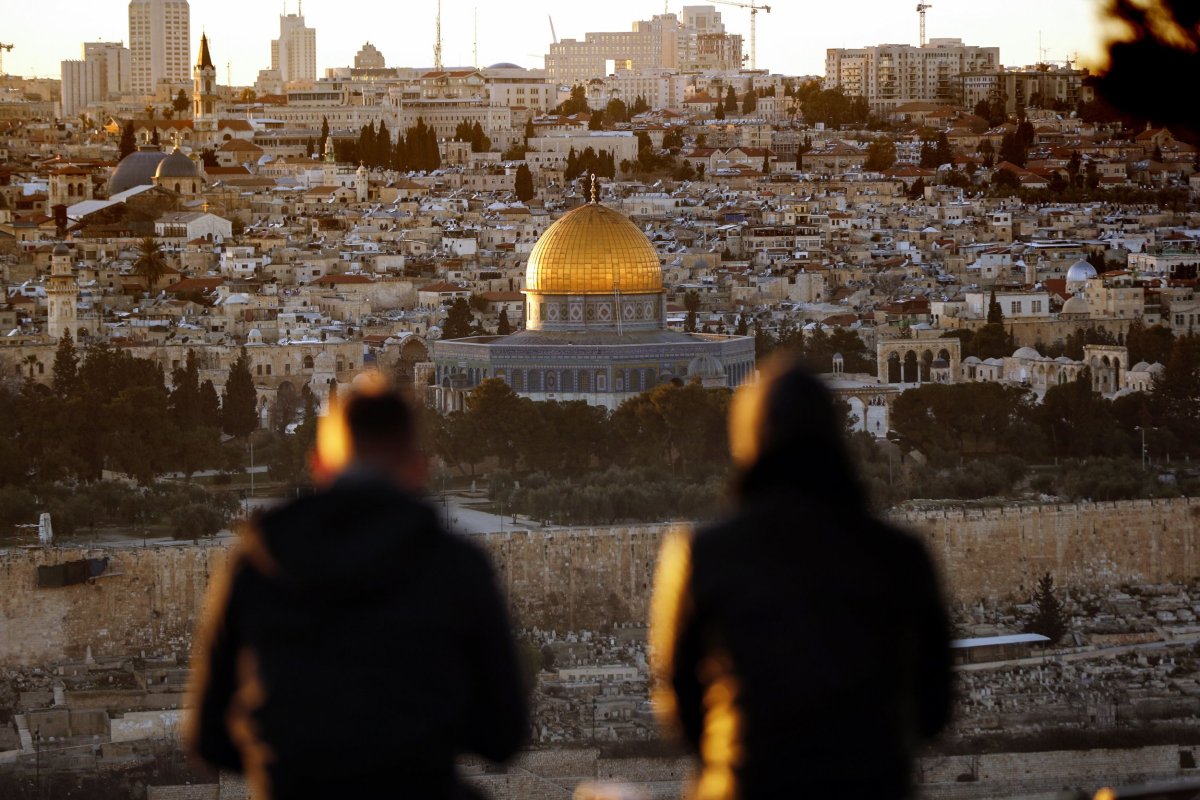
For probably the first time in 2,000 years, priests—wearing white gowns and sounding trumpets—sacrificed a sheep inside the walls of Jerusalem's Old City.
Religious Jews slaughtered the animal in the Jewish Quarter, in the shadow of the city's Hurva Synagogue, on April 6 according to the Times of Israel. It was a rehearsal for a religious spectacle planned to take place on the first day of the Jewish holiday of Passover, starting three days later.
As ancient Jewish tradition dictates, priests dripped the animal's blood on an altar set up at the site; it was then flayed, roasted and eaten.
Israeli police and veterinary services supervised the slaughter — the first ritual sacrifice to take place inside the walls of Jerusalem in 2,000 years, according to local media . The activist group behind the ceremony, the Temple Mount Institute, crowdfunded 36,000 shekels ($9,800) for the occasion.
But while the ritual was authorized in a rehearsal capacity, the police did not allow the main event to go ahead on April 9. Dozens of right-wing Jewish extremists had planned to follow the rehearsal with Passover sacrifices of goats or sheep on or around a contested holy site in Jerusalem, including outside al-Aqsa Mosque, which is referred to as Temple Mount by Jews and Haram al-Sharif (Noble Sanctuary) by Muslims.

The complex —which is the third holiest site in Islam and the holiest in Judaism— has served as one of the biggest flashpoints in the Israeli-Palestinian conflict. Israel captured the Old City of Jerusalem during the 1967 Six Day War, but left the site under the administration of a Jordanian-Palestinian-led Islamic Waqf , or Islamic Trust. Non-Muslims are permitted to access the site in between Muslim prayer times but are forbidden from praying.
In recent years there has been a growing movement from within the Israeli religious right for Jews to be allowed to perform rituals and pray at the site, regardless of the status quo. The religious Jewish activists see the sacrificial killing of goats and sheep as a mark of their claim of ownership of the religious site. As a result, Israeli authorities have banned some religious extremists, mostly members of the "Return to the Temple Mount" activist group, from entering Jerusalem during Passover.
Israeli police have disrupted at least three such plots to carry out animal sacrifices as an offer to God, a Torah commandment, since Sunday.
Israeli police spokesman Micky Rosenfeld said Wednesday that on Monday a total of 17 people were arrested after attempting to smuggle baby goats onto the site and reenact a biblical sacrifice. Police searched cars coming in and out of the Old City.
Read more: Israel arrests Jewish activists for Passover plot to sacrifice lamb on Temple Mount
The same day, police arrested a Jewish man carrying a baby goat to the Old City on suspicion of planning a ritual sacrifice. A day earlier, police arrested several Jewish activists, including five minors, for the same plan. Itamar Ben Gvir, a lawyer for the activists, condemned the arrests as "silencing" freedom of worship, saying that Israel is "losing its democratic character."
Analysts say performing such an act at the site could inflame tensions with Arab neighbors in the city and lead to an escalation of unrest and violence in the decades-old conflict.
The site is deemed so sensitive that Israeli Prime Minister Benjamin Netanyahu imposed an 18-month ban on Jewish Israeli lawmakers visiting it. He intends to start gradually lifting that ban, according to i24News. The visit of former leader Ariel Sharon to the site in September 2000 is considered one of the main sparks for the Second Intifada, or uprising, that lasted until 2005.
Palestinian leadership has said the perceived Israeli changes to the status quo at the site in recent years have been driving wave of violence against Israelis that began in September 2015. Palestinians have carried out stabbing, car-ramming and shooting attacks that killed dozens of Israelis.
Passover began on Tuesday and ends on April 18. With just under a week remaining of the religious holiday, authorities may have more work to do in the coming days.
Uncommon Knowledge
Newsweek is committed to challenging conventional wisdom and finding connections in the search for common ground.
Newsweek is committed to challenging conventional wisdom and finding connections in the search for common ground.
About the writer
Jack is International Security and Terrorism Correspondent for Newsweek.
Email: j.moore@newsweek.com
Encrypted email: jfxm@protonmail.com
Available on Whatsapp, Signal, Wickr, Telegram, Viber.
Twitter: @JFXM
Instagram: Read more
To read how Newsweek uses AI as a newsroom tool, Click here.








